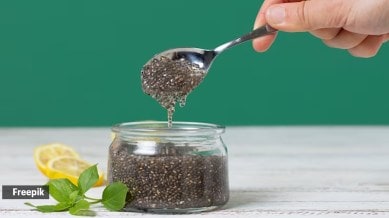📣 For more lifestyle news, click here to join our WhatsApp Channel and also follow us on Instagram
NHS surgeon calls chia seeds yoghurt ‘gold dust’, says it works ‘better than in water’ for the gut; dietitian verifies
Chia in water provides a quick, dairy-free option for hydration and fibre, making it ideal for vegans, those with lactose intolerance

Chia seeds, known to be a rich source of fibre, are considered good for health. But what is the best way to have them for optimal gut health? If social media chatter is to go by, chia seed yoghurt works better than with water.
NHS surgeon Dr Karan Rajan recently picked a chia yoghurt combination over chia-water. Why? “Chia in yoghurt works ‘better’ than in water because the protein, fat, and probiotics in yoghurt slow how the seeds hydrate and release fibre,” he pointed out in an Instagram post.
monthly limit of free stories.
with an Express account.
If you eat chia seeds with yoghurt rather than water, you get more benefits for your gut and the microbiome. “Yoghurt contains live bacterial cultures like lactobacillus and bifidobacteria. Chai’s soluble fibre and mucilage act as prebiotics, thus feeding these bacteria. When eaten together, you get this natural symbiotic effect. Probiotics in the yoghurt have a ready source to ferment, which can improve short-chain fatty acid production. That’s the good stuff which is gold dust for your health,” he said.
Also, the calcium, vitamin D, and fat in the yoghurt enhance the absorption of fat-soluble compounds in the chia, namely Omega 3 fatty acids. One of the biggest benefits of eating more fibre is appetite regulation. When you combine fibre from chia seeds and protein and fat from the yoghurt, you get even more satiety signals and even more stimulation of natural fullness hormones like GLP-1, cholecystokinin, PYY, etc. So, you feel fuller for longer compared to water,” elaborated Dr Rajan.
He also added that combining dairy proteins and peptides from the yoghurt with fibre in chia seeds gets you a slower, more consistent fermentation of those compounds in the colon.
“This leads to a wider range of short-chain fatty acids. Whereas chia seeds in water lead to faster fermentation in the early parts of the colon, which could cause excessive gas production and a narrower range of short-chain fatty acids,” said Dr Rajan.
“That being said…do whatever you want because chia is great either way,” said Dr Rajan.
Dt. Gulnaaz Shaikh, Chief Dietitian, KIMS Hospitals, Thane, concurred with Dr Rajan and shared that pairing chia seeds with yoghurt can give your gut health a boost. “While chia in water hydrates quickly and releases fibre early in digestion, yoghurt’s protein, fat, and probiotics slow down how the seeds swell and release their nutrients. This means the fibre ferments later in the colon, encouraging the growth of beneficial bacteria and producing more balanced short-chain fatty acids like butyrate and propionate. These compounds are linked to reduced inflammation, better colon health, and improved metabolic balance,” said Shaikh.
She also mentioned that the healthy fats in yoghurt can help the body absorb omega-3s from chia more efficiently. “You also get the added benefit of yoghurts live cultures and bioactive peptides, which support a healthy gut microbiome alongside chia’s fibre,” added Shaikh.
Who can benefit from both chia in yoghurt and chia in water?
Both options can be good for almost everyone looking to improve fibre intake, satiety, and digestion. “Chia in yoghurt may be especially helpful for those who want a more filling snack, people with sensitive digestion who prefer gentler fermentation, and anyone wanting to boost protein and probiotic intake,” said Shaikh.
Chia in water provides a quick, dairy-free option for hydration and fibre, making it ideal for vegans, those with lactose intolerance, or anyone wanting a light gut-friendly drink. In both cases, chia offers omega-3 fatty acids, plant-based protein, and soluble fibre, which can help regulate bowel movements and support healthy gut bacteria, noted Shaikh.
What should people keep in mind before trying this?
-Portion size matters. One to two tablespoons of chia seeds a day is enough for most adults.
-Hydration is key. Chia absorbs liquid, so drink enough water alongside it to avoid discomfort.
-Watch out for intolerances. Choose yoghurt that suits your needs, such as lactose-free or plant-based, if dairy is a concern.
-Go slow. If you are not used to high-fibre foods, start with smaller amounts to let your gut adjust.
-Pair wisely. Adding fruit, nuts, or spices can improve flavour and nutrient value.
Did you love reading this piece? Here are some other informative articles on gut-health you may have missed:
Gut health wellness garners mainstream attention, adulation: What’s driving the rage?
‘I am a gastrointestinal surgeon, these are the top 4 foods I consume for better gut health’
‘Your body knows best’: As per Ayurveda, the 5 most effective times during the day to drink water are…
DISCLAIMER: This article is based on information from the public domain and/or the experts we spoke to. Always consult your health practitioner before starting any routine.
📣 For more lifestyle news, click here to join our WhatsApp Channel and also follow us on Instagram